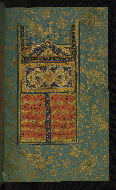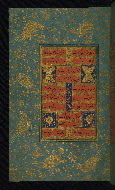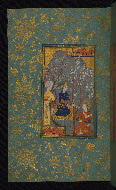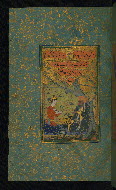Home > Digitized Walters Manuscripts
This document is a tranformation of a TEI P5 XML manuscript description incorporating images. If you have trouble reading special or non-Latin characters on this page, please make sure you have appropriate Unicode fonts installed and an up-to-date web browser.
Walters Ms. W.651, Poems (tarji'band)
Browse images (Browse images in a new window) | TEI in XML format
W.651
Poems (tarji'band)
Vernacular: ترجيع بندها
Authority name: Jāmī, 1414-1492
As-written name: Nūr al-Dīn ʿAbd al-Raḥmān ibn Aḥmad Jāmī
Name, in vernacular: نور الدين عبد الرحمان بن احمد جامي
Note: Author dates preferred by cataloger: d. 898 AH / 1492 CE
This is an illuminated and illustrated manuscript of a small collection of short love poems of the type called tarjī`band by Nūr al-Dīn ‘Abd al-Raḥmān Jāmī (d. 898 AH / 1492 CE). It was copied in black nasta‘līq script by the calligrapher Muḥammad Zamān al-Tabrīzī in 998 AH / 1589-90 CE in Safavid Iran. The text is written on orange-tinted paper, and the bluish-green borders are illuminated throughout. The manuscript opens with an incipit page with illuminated headpiece (fol. 1b), and there are two illustrations (fols. 3a and 6a). The Qajar lacquer binding is decorated with floral motifs and is inscribed with verses attributed to Imām ‘Alī ibn Abī Ṭālib. An ownership statement is present, and dated 1311 AH / 1893-4 CE, stating that this precious book was bought for his son, Maḥmūd Askānī, from a woman for 10 ashrafis (gold dinars) (fol. 6b).
998 AH / 1589-90 CE
Iran
As-written name: Muḥammad Zamān al-Tabrīzī
Name, in vernacular: محمد زمان التبريزي
Book
Literary -- Poetry
The primary language in this manuscript is Persian. The secondary language of this manuscript is Arabic.
- Transliteration: tammat al-kitāb bi-ʿawn al-Mālik al-Wahhāb /1/ sawwadahu al-ʿabd al-aqall Muḥammad Zamān al-Tabrīzī /2/ sanah 998 /3/
- Comment: In Arabic, giving the name of the calligrapher and date of copying
Paper
Orange-tinted paper with bluish-green borders
Foliation: ii+6+ii
Catchwords: Written obliquely on versos
11.0 cm wide by 17.5 cm high
5.5 cm wide by 9.5 cm high
- Columns: 2
- Ruled lines: 10
- Mostly two columns that alternate with single columns and obliquely written verses
- Title: Tarjīʿbandhā
- Author: Jāmī, 1414-1492
- Scribe: Muḥammad Zamān al-Tabrīzī
- Incipit: اي روي تو ماه عالم ﺁراي ...
- Hand note: Written in black nastaʿlīq script
- Decoration note: Two illustrations; incipit page with illuminated headpiece; illuminated contour panels and rectangular and triangular pieces in the text area; illuminated borders with animal, plant, and bird motifs
fol. 1b:

- Title: Incipit page with illuminated headpiece
- Form: Incipit; headpiece
- Label: This incipit page with illuminated headpiece has a bluish-green border decorated with floral and fauna motifs.
fol. 2a:

- Title: Illuminated text page
- Form: Text page
- Label: This text page is written in nasta‘līq script on orange-tinted paper by the calligrapher Muḥammad Zamān al-Tabrīzī in 998 AH / 1589-90 CE in Safavid Iran. The bluish-green borders are illuminated in an early Safavid style.
fol. 3a:

- Title: A garden scene with three men
- Form: Illustration
- Label: In a garden, three men gather and exchange poetic verses.
fol. 6a:
The binding is not original.
Dates to the thirteenth century AH / nineteenth CE; Qajar lacquer (without flap); floral motifs in the center panel; Arabic inscription in riqā’ script in the top and bottom panels quoting Imām ‘Alī ibn Abī Ṭālib and highlighting the exercise of elegant writing as a means of income
Ownership statement written by Ḥusayn Qavām Daftar (?) and dated 1311 AH / 1893-4, stating that this precious book was bought for his son, Maḥmūd Askānī, from a woman for 10 ashrafis (gold dinars) (fol. 6b)
Walters Art Museum, 1931, by Henry Walters bequest
Richard, Francis. Catalogue des manuscrits persans. (Paris: Bibliothèque nationale, 1989), no. 245/II.
Principal cataloger: Gacek, Adam
Catalogers: Landau, Amy; Smith, Sita
Editor: Bockrath, Diane
Conservators: Jewell, Stephanie; Quandt, Abigail
Contributors: Barrera, Christina; Emery, Doug; Herbert, Lynley; Noel, William; Simpson, Shreve; Tabritha, Ariel; Toth, Michael B.; Valle, Chiara
The Walters Art Museum
Licensed for use under Creative Commons Attribution-NonCommercial-ShareAlike 3.0 Unported Access Rights, http://creativecommons.org/licenses/by-nc-sa/3.0/legalcode. It is requested that copies of any published articles based on the information in this data set be sent to the curator of manuscripts, The Walters Art Museum, 600 North Charles Street, Baltimore MD 21201.
